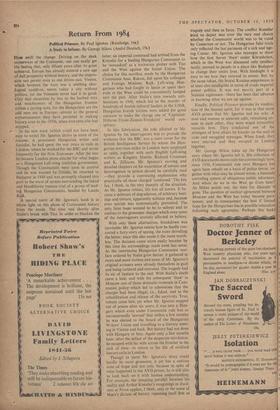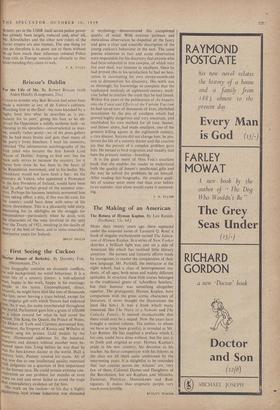Return From 1984
Political Prisoner. By Paul Ignotus. (Routledge, 16s.) A Study in Infamy. By George Mikes. (Andre Deutsch, 15s.)
How swift the change. Driving on the sleek motorways of the Continent, one can easily get the feeling that, only fifteen years after its great upheaval, Europe has already entered a new age of dull proSperity without history, and the impres- sion can persist even as one drives east. Vienna, which between the wars was a seething ideo- logical cauldron, seems today a city without politics, yet the Viennese never had it so good. Only that excursion by bus to the barbed wire and watchtowers of the Hungarian frontier strikes a jarring note, for the Hungarians are the odd men out in Europe—almost to the general embarrassment they have persisted in making history even in the 1950s, when everyone else had stopped.
• In his new book (which could not have been easy to write) Mr. Ignotus shows us some of the ▪ reasons. A prominent Hungarian writer and Socialist, he had spent the war years in exile in London, where he worked for the BBC and wrote frequently for the New Statesman. After the war he became London press attaché for what. began as a Hungarian. Left-wing coalition government. Though the Communists were soon in control and he was warned by friends, he returned to Budapest in 1949 and was promptly clapped into gaol in the wave of arrests surrounding the faked and bloodthirsty treason trial of a group of lead- ing Hungarian Communists, headed by Laszlo Rajk.
A special merit of Mr. Ignotus's book is to throw light on this phase of Communist history from the inside. The time was shortly after Stalin's break with Tito. In order to blacken the latter, an imperial command had arrived from the Kremlin for a leading Hungarian Communist to be 'unmasked' as a traitorous plotter with Tito and the West against the Soviet Union. The choice for this sacrifice, made by the Hungarian Communist boss, Rakosi, fell upon his colleague and Foreign Minister, Rajk. Left-wing Hun- garians who had fought in Spain or spent their exile in the West could be conveniently lumped into the plot. After Stalin's turn towards anti- Semitism in 1948, which led to the murder of hundreds of Jewish cultural leaders in the USSR, Hungarian Jewish victims were added for good measure to make the charge one of 'Capitalist- Hitlerist-Titoist-Zionist-Trotskyist' world con- spiracy.
In this fabrication, the role allotted to Mr. Ignotus by his interrogators was to provide the evidence that the BBC was a mere cover for the British Intelligence Service by whom the Hun- garian war-time exiles in London were employed as spies, together with such English Left-wing writers as Kingsley Martin, Richard Crossman and K. Zilliacus. Mr. Ignotus's moving and detailed chapters on his experience of torture and interrogation in prison should be carefully read —they provide a convincing explanation why practically all those charged 'confessed.' The key lay, I think, in the very insanity of the situation. As Mr. Ignotus relates, life lost all norms. It be- came a delirium of degradation, of arbitrary beat- ings and torture, apparently without end, because even suicide was systematically prevented. The only faint hope seemed to be to submit and to confess to the grotesque charges which even some of the interrogators scarcely•affected to believe.
With only these alternatives, breakdown was inevitable. Mr. Ignotus relates how he finally con- cocted a fairy story of spying, the more drivelling the better, since this also made it the more worth- less. The decision came more easily because by this time his surroundings made even less sense. As the internecine Hungarian Communist war- fare ordered by Stalin grew fiercer, it gathered in more and more victims and some of Mr. Ignotus's original accusers were already themselves in gaol and being tortured and executed. The tragedy had its air of fantasy to the end. With Stalin's death came a halt; and with the subsequent 'thaw' in Moscow one of those dramatic reversals in Com- munist policy which led to admissions that the charges had been illegal, i.e., faked, and to the rehabilitation and release of the survivors. True, release came late, yet when Mr. Ignotus stepped out of prison after six years, it was into a Hun- gary which even under Communist rule was so unconcernedly 'normal' that within a few months he was elected to the board of the Hungarian Writers' Union and travelling to a literary meet- ing in Vienna and back. But history had not done with Hungary or him. Again only a few months later, after the defeat of the desperate revolution, he escaped with his wife across the frontier in the nick of time—to return to his life of civilised literary exile in London.
Though in parts Mr. Ignotus's story could hardly be more gruesome, it yet has a curious note of hope and not only because in spite of what happened in the AVO prison, he is still able to look back on it with human understanding. For example, the tempting .parallel between his reality and Arthur Koestler's imaginings in Dark- ness at Noon applies, I think, only in the sense of Marx's dictum of history repeating itself first as
tragedy and then as farce. The conflict Koestler tried to depict was over the very real choice whether the Communist world was to be ruled by Caesarism or not. The Hungarian fake trials only reflected the last paranoia of a sick and age- ing Caesar. Mr. Ignotus also manages to show how the first Soviet 'thaw' under Khrushchev, which in the West was discussed only intellec- tually,
seemed to people in a place like Budapest to change their entire lives. With hindsight it is easy to see how they misread its extent. But, by the same token, the brutal Russian suppression is at least also intelligible in terms of crude imperial power politics. It was not merely part of a Stalinist nightmare—there has been that advance in knowing what we are up against.
Finally, Political Prisoner provides its vindica- tion of the human spirit, for it was in that same AVO prison that Mr. lgnotus met his wife. A man and woman in separate cells, remaining un- seen to each other, they were urged irresistibly towards love. They conducted one of the strangest of love affairs by knocks on the wall in code and smuggled messages. When freed, they were married and they escaped to London together.
Mr. George Mikes takes up the Hungarian story where Mr. Ignotus left it. His collection of AVO documents shows only too convincingly how, since 1956, Communist rule over Hungary has again been rebuilt on a basis of police terror, to- gether with what may be almost worse, a humanly corroding system of ubiquitous public informers. And where do we in the West go from here? As Mikes points out, the time for illusions is gone. The question of nuclear agreement between Moscow and the West has today become para- mount, and in consequence the best if limited hope for the Hungarians lies in possible relaxation following such agreement. Perhaps this looks distant, yet in the USSR itself secret police power has already been largely reduced and, after all,.
r. Khrushchev and the other new rulers of the Soviet empire are also human. The one thing we can do therefore is to point out to them without let-up how much their infamous colonial Police State rule in Europe remains an obstacle to that understanding they claim to seek.
T. R. FVVEL







































 Previous page
Previous page